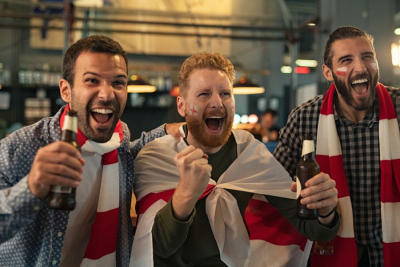At the last Football World Cup hosted in Russia in 2018, we predicted that owing to the timings of the England games, business had little to fear from alcohol-induced staff absences in the days following matches. How wrong we were!
Last time, the day after England’s opening game of the tournament, which they won, some reports claimed that absences in the UK increased by as much as 36% above normal levels. The rise was largely blamed upon sore heads after an evening of celebration and revelry.
This year, England’s and Wales’s group games are scheduled at what might be described as potentially disruptive times. Therefore, with just over a week until the start of the tournament, employers might want to decide on a stance they take on absences that is communicated across the organisation.
As England are expected to proceed beyond the group stages, employers are also likely to have to consider whether the knockout stages have potential to cause disruption too.
In agreeing a contract of employment, employees are committing to make themselves available for work at the times laid out within the contract. They must therefore make every effort to present themselves fit to do so. Overindulging in alcohol in the evenings to the extent where it compromises attendance and/or timekeeping is in breach of the contract and so subjects the employee to an investigation and potentially disciplinary action.
Furthermore, employees who fail to attend work claiming to be sick can be at risk of disciplinary action up to and including dismissal if their employer has evidence that they are not actually sick.
There may be a temptation to let the odd “sickie” go, considering the fact that we’re in the midst of a World Cup competition. After all, unless you have a company sick-pay scheme that dictates it, you don’t have to pay an employee for one day of sickness absence. However, this sends the wrong message and could make it difficult to meaningfully enforce any action or sanctions on future occasions.
Whilst we understand that businesses may not want to interfere with their staff’s leisure time, they will want to remain productive, and so having a planned approach is probably a good idea. Let’s look at each of England’s group games in turn, but remember that as a multicultural society you’re likely to have employees who are supporting other teams.
Game 1: England vs Iran. Monday 21st November – Kick-off 1.00pm
As this game is in the middle of the day, staff who want to watch it will probably need to take the day-off as holiday, or at least a half-day. If you offer flexi-time, an extended lunch break might cover it. Be conscious of staff returning from watching the game down the pub. If you’re a consumer led business, you may find that you don’t get many customers whilst the match is on anyway and so having a radio on in the workplace might be OK.
Game 2: England vs USA. Friday 25th November – Kick-off 7.00pm
Unless you’re open on Saturday’s, this isn’t likely to cause you any issues. For those that do operate on the weekend, a reminder of expectations will probably be well placed. Where company drivers are concerned, a reminder about your breathalyser policy, if you have one might also be a good idea.
Game 3: England vs Wales. Tuesday 29th November – Kick-off 7.00pm
Yes, England and Wales are in the same group and the added rivalry is going to make this a game with broad appeal. Even though it’s on a ‘school-night’, we should expect that people will want to watch this in an environment where alcohol is present. You could be generous and allow employees a late start the following day but is that’s not appropriate then a pre-booked day’s holiday might be an option. Even then, if you’re inundated, you may have to refuse some requests.
Don’t forget your duty of care as an employer and if it transpires that alcohol dependency or another underlying health issue exists, you’ll need to take a different approach. Also, whatever your approach, ensure that you exercise fairness, equality and offer choices to all members of your team. After the success of the England women’s team, don’t fall into the trap of assuming it’s just the men that want to go to the pub to watch the football. That’s something that could easily get you into trouble for discrimination.
For any help and support with your approach to the World Cup, call us on 01452 331331 or e-mail This email address is being protected from spambots. You need JavaScript enabled to view it.



